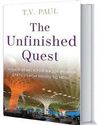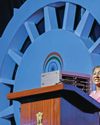
The world is still coming to terms with Donald Trump’s return to the White House. Many had no doubt predicted, even feared, this outcome, particularly when a frail Joe Biden began to slur, slip and stumble. Yet, once Kamala Harris was pitchforked into the campaign—and made early gains—there was a residual hope in sections of American society and many parts of the world that Trump would be kept out. Hope is not the right word; it was more a reality-denial. Many were just not willing to believe that a man twice impeached and prosecuted four times, a convicted felon on multiple counts, could actually become the most powerful man in the world. Again. They clung on to the outdated belief that decency, however uninspiring, would always trump dark vision.
Sooner, rather than later, acceptance must replace anguish. Trump has won emphatically not only the electoral college but, for the first time, the popular vote. More than half of the voters wanted him back to the White House, and there is no greater backing in a democracy. His supporters have overlooked, by free choice, his trademark profanities, his misogyny, racism and his vulgar machismo. They have forgiven his violent obstruction to the transfer of power in 2020. They have unconditionally bought into his narrative of Making America Great Again (MAGA), no matter what the cost. Immigration and inflation proved more powerful than being woke or championing abortion; even multi-racial working-class groups and women voters have swung towards him. There was an undeniable rightward shift in all 50 states. Clearly, despite Biden’s investments in manufacturing and infrastructure, people were unhappy with the Democrats; they voted for ‘Change with Strength’. The inescapable conclusion: Trump 1.0 was not an aberration, an inexplicable blip. It was a logical sign of shifting political realities and cultures.
This story is from the November 24, 2024 edition of THE WEEK India.
Start your 7-day Magzter GOLD free trial to access thousands of curated premium stories, and 9,000+ magazines and newspapers.
Already a subscriber ? Sign In
This story is from the November 24, 2024 edition of THE WEEK India.
Start your 7-day Magzter GOLD free trial to access thousands of curated premium stories, and 9,000+ magazines and newspapers.
Already a subscriber? Sign In

Why Trump covets Greenland
There’s no denying it. Donald Trump is a prince among real estate developers, known for his pushy, winner-takes-all approach.

Bomb man who kept his mouth shut
The best thing about Rajagopala Chidambaram, who passed away recently, was that he “could keep his mouth shut”, as his mentor Raja Ramanna wrote in his memoir, Years of Pilgrimage. No wonder, he tested six atom bombs with no CIA, ISI or satellite spy eyes getting any wiser beforehand.

Extreme to mainstream
With the recent surrender of six Naxals, Chief Minister Siddaramaiah declares Karnataka almost “Naxal-free”. The BJP is questioning his “closeness” to the far left

SUMMITS, SURVIVAL AND SERVICE
Mountaineering expeditions play a crucial role in mountain warfare training

EYES ON THE ICE
THE INDIAN ARMY TRAINS ITS MOUNTAIN WARRIORS AT THE MACHOI GLACIER WHERE THEY LEARN ICE AND SNOW CRAFT IN SUB-ZERO TEMPERATURES. THE HIGH ALTITUDE WARFARE SCHOOL IN GULMARG PREPARES THEM FOR WARS THAT ARE DRIVEN BY TECHNOLOGY AND INTELLIGENCE. ON SNOW-COVERED BATTLEFIELDS LIKE THE HIMALAYAS, THE ARMY WANTS ITS JUNIOR LEADERSHIP TO BECOME DECISION-MAKERS AT THE TACTICAL LEVEL

Time to dream big
Every year, January 12 is celebrated as National Youth Day—as homage to the birth anniversary of Swami Vivekananda, honouring his enduring teachings and visionary ideas.

Climbing the power ladder
In his latest book, T.V. Paul explores India's search for its day in the sun as a global power

Howdy, rowdies
The world is already exhausted, and Donald Trump has not even begun his second term.

The going gets rough
It’s been a very macho fortnight

Eastward Ho!
Odisha, which hosted this year's Pravasi Bharatiya Divas, is emerging as a focal point for India's Act East Policy, given the turmoil in the northeast